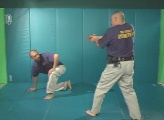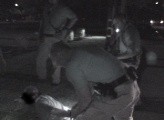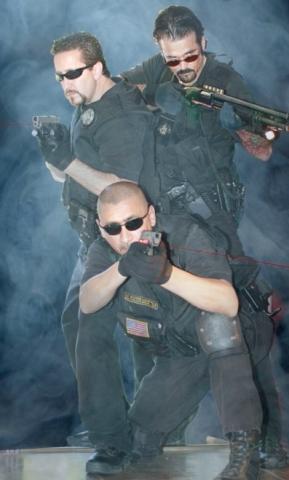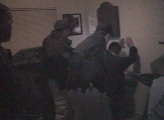BAIL SCHOOL CLASSES HELD IN
Sacramento, Modesto, Stockton, San Jose, Los Angeles, San Diego, Norco, Riverside, Inland Empire & Privately Ordered
California Department of Insurance Approved Bail Education
Primary Bail Expert Instructor Opinion Editorials
IS BAIL DEAD?
Opinion Editorial
By Rex Venator
“Bail is dead; don’t get into bail!” is a commonly stated reply to people who randomly and curiously contact bail agency owners to essentially, and I am paraphrasing, ask as follows: “I’d like to become your direct competition, but I first need to know from you yourself if it is a good idea to become your competition; therefore, should I get into bail?”
The strategy of making inquiry as loosely described above is very curious to me; moreover, I cannot attach any understanding as to why anyone would, and many people often report doing essentially what is described above, approach a person in an industry with an oblique agenda that is pretty obvious to any first year bail agent.
Here we arrive at whether or not it is a good idea to enter into the bail industry based on unbiased, anecdotal and empirical evidence available on this bail education website, Facebook page, and any of Bailspeak’s other websites versus an apocryphal as referenced in paragraph one above.
My opinion on the subject is unbiased because I spend more time on a landline or cellular phone trying to talk people OUT of pursuing a career in the bail bonds and bounty hunting industries over encouraging the attempt to do so.
Why would a bail educator try to steer people away from bail and bounty hunting? This question may be answered by an historical fact framed as a question; why are hundreds upon hundreds of Bailspeak Alumni now working in the California Bail Bonds Industry in one or more capacities? Could it be that Bailspeak Alumni are principally hardy folks who Could Not and Would Not be talked out of attempting to enter into the bail bonds and bounty hunting realm of the American Justice System in a ten minute phone call?
It is my position that any person who strikes out into the California Bail Industry via Bailspeak succeed, and, if I can talk a person out of the proper application of “intestinal fortitude” in a five or ten minute phone call then, perhaps, bail or bounty hunting isn’t right for them and will bluntly state as much more frequently than not. I do not intend to be “mean-spirited” by talking people out of bail and bounty hunting; I simply advance an honest opinion based on available conversational questions and answers to save people time and money.
So, is “Bail Dead?” Spend some time on Bailspeak’s Mother Website and any of its related sister websites where you will find:
· Bail Class Photos primarily installed on each bail website for consumer protection
· Bail Class Photos primarily depicting a very high percentage of new bail hires
· Verifiable testimonials from 100s of real people who put their opinions of Bailspeak in writing
· Is it not reasonable to conclude that Bailspeak and its History would not exist but for a lively California Bail Industry?
So is “Bail Dead?” Visit any of Bailspeak’s Bail Education websites including, Facebook and YouTube, and you will find:
· Bail Agent Pre-Licensing class videos
· Real Bounty Hunting videos
· Taser User Certification videos
· Bail Motion Continuing Bail Education Videos
· Bounty Hunter quasi tutorial videos
· Bail Bonds Marketing Videos
· Harley Davidson just because videos
Is it not reasonable to conclude that if “bail” really was “dead” then there is no way that Bailspeak’s Internet videos could possibly be rapidly approaching a half a million views in such an obscure area of the employment market and criminal justice system?
Is bail or bounty hunting for everyone? No. If bail and bounty hunting were easy then it wouldn’t be so obscure.
Can you succeed in bail or bounty hunting? I cannot answer whether or not you can make it in bail or bounty hunting because I don’t know you or anything about you; however, what I do know are people—lots and lots of people—who are making it in bail and bounty hunting but they all work their hindquarters off—non-stop!
So, is “Bail Dead?” Perhaps this question is best decided by you?
SPECIAL WEAPONS AND TACTICAL TRAINING
FOR LOS ANGELES BASED BOUNTY HUNTERS?
Opinion Editorial
By Rex Venator
The business of bounty hunting is the result of a private civil contract between private citizens who, by the nature of bail, themselves, voluntarily invoke the jurisdiction of the government inasmuch that a defendant’s own failure to perform on the private civil bail contract made his or herself a fugitive from justice and equally triggers the enforcement of the bail contract by bounty hunters as a civil matter that is, oddly, under the jurisdiction of a criminal court.
Fugitive recovery by bounty hunters seems simple enough, but tracking and apprehending wanted fugitives is horrifically complex when one begins to understand that no one code or section of a code but many separate codes and code sections are applicable during the act of bounty hunting.
Here we arrive at a growing number of, arguably, makeshift bounty hunter schools in Los Angeles California that are, from an experienced bounty hunter’s perspective, plainly jury-rigged together from, on the surface, seemingly related areas of private-sector security and executive protective training arriving from people with backgrounds in civilian law enforcement, special weapons and tactical police units, military special operations and with seemingly heavy emphasis NOT on private bail contract enforcement but, rather, firearms training, close quarter (S.W.A.T.) battle dynamic entry training, and all of which is nevertheless important; however, there is much, much, more to becoming a bounty hunter then causing the reasonable person to believe that one or more persons are peace officers by a combination of variables such as clothing, badges, weapons, behaviors, and not knowing how to speak to a reasonable person like a bounty hunter and not a cop.
In all fairness, I myself have been known to bounty hunt third strikers, looking at 25-to-life and nothing to lose by killing anyone attempting to apprehend them and in full tactical gear, but going tactical is rare and even more of a rarity than it was just ten years ago—times and public tolerances have changed and so then we must change our “tactics” in the bounty hunting trades.
Spending an inordinate number of training hours going through doors and firing weapons should be undertaken, in my personal opinion, as supplemental training and not primary bail enforcement training and should include areas of study such as applicable Penal, Business & Professions, Insurance, Government, Corporate, Civil Procedure, Evidence, Health & Safety, Welfare & Institutions, and other California Codes in combination with basic contract and bail law and motion studies of current published case cites and all of which have bits and pieces that come together to lawfully bounty hunt and with an emphasis on how to stay out of civil court, criminal court and the morgue.
California Penal law is clear when it comes to lawful bounty hunting; a bounty hunter must carry, at the very least and not total and complete in terms of requirements to bounty hunt in California, with him or her two certifications: 20 Hour Bail Agent Pre-Licensing certificate from a California Department of Insurance Approved Bail Education Provider, and a Penal Code 832 40 Hour Powers of Arrest P.O.S.T. (NOT the 40 hour Guard Card Powers of Arrest security course) certificate usually obtained through a college.
One may fire thousands of bullets and train for hundreds of hours like police officers serving a high-risk warrant, but not one bullet or training takedown scenario will make one a lawful bounty hunter without obtaining the aforementioned Penal Code 1299 Required bail fugitive recovery Certifications.
I’d like to be very clear here. Any person who is taking action to enter into the bounty hunting trades should and must undertake high-risk fugitive apprehension training in support of learning how to lawfully bounty hunt and not the other way around; learning how to lawfully bounty hunt, in my personal opinion, takes priority and should be a primary focus.
To put things in perspective, I myself have closed quite a few bounty cases with a warm cup of coffee, threadbare sweats, a keyboard, a mouse, and a working knowledge of bail law and motion with no guns, no body armor, no expensive multi-month investigations, and no liability! This strategy has never fallen short when it comes to cost to benefit analysis.
Have I been known to go through doors after wanted felony fugitives or traipsed through a heavily wooded area in pursuit of dangerous bail jumpers? Absolutely, but I’ve done every bit of my bounty hunting lawfully and liability-free since 1992. I’ve been bounty hunting for 22 years and didn’t open up a school in 2014 after retiring from a law enforcement agency after 22 years; there is a major distinction that should be considered by those seeking bail education.
It is your hind quarters on the line out there; it is you and your family who will suffer if something goes wrong, so do your own research to confirm what others—including me—tell you; don’t fall into the trap that because someone is licensed or has been this or that for 10, 20 or 30 years that they know what they’re talking about. You yourself should always do your own research to include Due Diligence on your bail jumper cases to avoid being sued, going to prison, maimed or killed.
I realize the last part of the above paragraph sounds contradictory to the crux of this opinion editorial with respect to prioritizing your training, but trained, educated and experienced bounty hunters can explain why it isn’t a clashing of logics but, rather, is the symbiotic nature of bounty hunting within our American Justice System.
Can Independent Bounty Hunter Contractors who are not Licensed Bail Agents Draft and Appear on a Bail Bond Motion for Sole Proprietorships or Bail Bond Corporations?
Opinion Editorial & Analysis
By Bailspeak’s Primary Bail Education instructor, Rex Venator
The following is based on my personal, layman’s opinion as a private citizen who is simply observing his civic duty.
I thought to follow up and add that the prior email on bounty hunters drafting moving papers and appearing in court for a bail bond surety isn’t applicable, in my personal opinion, with a licensed bail agent, appointed as an agent by the real party in interest bail bond surety moving a court, drafting and appearing under penal code law—so long as the bail agent is appearing for a sole proprietorship and not a bail bond corporation.
It is my personal, layman’s opinion that Penal Code §1305 subsection j does allow for “the bail agent” to draft and appear for an unincorporated bail bond company when he or she is appointed by the surety upon which the bond was written.
It is my personal, layman’s opinion that Penal Code §1305 subsection j carries greater weight and is deemed controlling over Business and Professions §6125 for the purposes of bail agents drafting and appearing on instant, civil matters injected into an existing criminal matter before a superior court.
There are published case cites, however, where the Civil Code of Procedures has sections that are controlling over certain Penal Code, bail related sections, but, for the purposes of this personal opinion analysis, bounty hunters who are not licensed bail agents and appointed by the surety do not have standing under Penal Code §1305 subsection j to draft and appear in superior court and are subject to Business and Professions §6125 penalty—in my personal, layman’s opinion.
It is my personal, layman’s opinion that the curiously lamented reference to an obscure California Civil Code of Procedure section that allows for a bounty hunter “surety insurer” to draft and appear in court is seriously flawed and fatal to any bounty hunter’s argument to the extent that Civil Code of Procedure 995.120 subsection a and b defines a “surety insurer” in part as follows: “‘Admitted surety insurer’ means a corporate insurer or a reciprocal or interinsurance exchange to which the Insurance Commissioner has issued a certificate of authority to transact surety insurance in this state, as defined in Section 105 of the Insurance Code,” “For the purpose of application of this chapter to a bond given pursuant to any statute of this state, the phrases ‘admitted surety insurer,’ ‘authorized surety company,’ ‘bonding company,’ ‘corporate surety,’ and comparable phrases used in the statute mean "admitted surety insurer" as defined in this section.”
Whereas, it is my personal, layman’s position that a bounty hunter appearing for a bail bond company as an independent contractor is, arguably, not drafting and appearing as an agent for the surety in any capacity and in such instances the matter in question then defaults to Business and Professions §6125 primarily because one well established structure of bail agents appearing for their own non-incorporated bail companies in superior courts reverts to another dictum based structure where, plainly stated, a private citizen—not even a corporate officer of the surety, which is also not applicable for the purposes of this personal, layman’s analysis—is somehow not even appearing in propria persona for the corporation and is likened to any person simply walking in off the street not to self-represent but to represent an entity that he or she isn’t even a corporate officer or shareholder of and all of which is because the bounty hunter is not a licensed bail agent who is appointed as an agent for any surety.
To be succinct in the interest of brevity, in my personal, layman’s opinion, a bounty hunter working as an independent contractor for a bail bond company is disallowed to appear under Penal law; moreover, Civil Code of Procedures does not apply because in the absence of Penal law applications the bounty hunter is then personally appearing for an incorporated surety where, arguably, said bounty hunter is engaging in the “unlicensed practice of law;” indeed, a corporation is not a natural person and cannot appear in propria persona; it can only appear through counsel with the exception of sending a corporate representative to small claims under Code of Civil Procedure section 116.510.
THE BOUNTY HUNTING LIFESTYLE
Opinion Editorial
By Rex Venator
It
strikes me as curious when a person purporting to specialize in something,
arguably, as a marketing ploy and, at the same time, issues declarative
statements of being a full-time bounty hunter, and here is why: full-time
bounty hunters typically work wholly unpredictable hours and days to the extent
that adhering to a set schedule of non-bounty hunting activities isn’t
possible; bail education instructors must, as promised, teach 20 hours or more
spanning 3-days or more to the extent that full-time bounty hunting isn’t
possible since bail jumpers are inconsiderate about one’s time away from, well,
full-time bounty hunting; any person claiming to be a full-time bounty hunter
and bail education instructor must be one or the other to the extent that one
cannot have it both ways.
People sometimes ask if I still bounty hunt. The answer is yes, but I cannot be
a full-time bounty hunter and a bail education instructor at the same time;
moreover, it only makes sense to “farm out” bounty hunting capers to new people
so that they may get their experience bounty hunting.
In point of fact, a new law went into effect in recent years wherein I decided
to keep pre-2010 bounty hunting videos, representative of my work, private and
not use post-2010 bounty hunting videos to avoid potential liability problems.
In short, there is plenty of post-2010 bounty hunting video; I just chose to
avoid problems with the aforementioned law.
One has to wonder how it is that one can claim to maintain the rigors of
full-time bounty hunting while, at the same time, also claim to provide bail
education supported by full-time bounty hunting; it makes no sense to anyone
who has actually been bounty hunting full-time and also committed to bail
education as an instructor with a regimented schedule inconsistent with the
“lifestyle” of full-time bounty hunting, in my personal professional opinion.
Stated differently and in my personal opinion, any person who claims to be a
full-time bounty hunter and, simultaneously, bail education instructor, is
obligated to explain how it is that one may “live the lifestyle” of
unpredictable hours and days of bounty hunting AND live the regimented,
structured life of a bail education instructor.
Somewhere, the two “worlds collide” and create a paradox necessitating
explanation or concession or a confession that one or the other cannot possibly
be true.
I’m just saying and in my personal opinion as a bail education instructor who
bounty hunts and farms out bounty hunting capers to new bounty hunters.
BAILSPEAK PUBLIC SERVICE & GRIFTER ADVISORY
Caveat Emptor – Caveat Lector – Caveat Venditor
This Office has received an ongoing pattern of reports spanning several months from numerous persons who independently allege undergoing so-called “certification”or “licensing” courses, mostly in Southern California, with respect to their attempts to comply with the requirements to lawfully bounty hunt in California and beginning with California Penal Code Section 1299.01 of the Bail Fugitive Recovery Persons Act, heretofore called “1299.”
Many of these callers, after thoroughly researching applicable statutes, have themselves come to realize that the courses largely found on Craigslist, pitched by a variety of curious means and characters, paid for and all of which eventually leads people to conclude that such courses failed to meet statutory requirements which is all consistent with many, many ongoing complaints.
In the interest of brevity on this topic, I am taking the liberty of reposting a grainy and seemingly unimportant video wherein a pre-hunt meeting is taking place. I strongly, strongly suggest those interested in lawful bounty hunting to listen very closely to what is being said and read the captions; indeed, any person who takes approximately 5 minutes and 27 seconds to watch this video once and maybe twice will reduce his or her chances of being drawn into a course that is NOT “approved” by the California Department of Insurance and/or P.O.S.T. pursuant to 1299 and many other statutes from different codes applicable to bounty hunting.
Those persons who believe that they were told a course met any 1299 requirements and such claim turned out NOT to be true, paid money for something that is NOT approved by the California Department of Insurance or P.O.S.T., was handed or otherwise received a so-called California “Bail Enforcement License,” and were told that they could “bounty hunt in all 50 states,” may each wish to take their stories to the local California law enforcement agency or district attorney’s office holding jurisdiction over the geographical location where money changed hands and/or a “class” was held. Such stories may even spark the interest of a tort lawyer?
Such reports of shady hucksters are not new; however, my efforts to encourage people to notify the appropriate authorities of such activities beginning in 2014 will be new; furthermore, any person who claims to be a Bailspeak instructor who is not, fraudulently collects money for any of Bailspeak’s California Department of Insurance “Approved” courses feloniously, and any person who insists on using Bailspeak’s copyrighted materials in non-Bailspeak classes will have automatically made Bailspeak and its owner the “Victim” to the extent that I myself will pursue all available legal remedies to Protect the Public from people I personally believe are nothing more than common grifters preying on good people who trust or trusted them.
Lastly, this video also explains in great detail what you need to lawfully bounty hunt in California including a synopsis of legally required certification and documentation requirements—five minutes and 27 seconds can Protect the Public.
How to Find Bail Jumpers as a Fugitive Recovery Agent?
STREET PROVEN bounty hunters display certain sets of intransigent behaviors that most people cannot connect to and therefore do not perceive as virtues but are, nevertheless, inescapably inherent with every accomplished bounty hunter that I have personally met who presents as having a future in bounty hunting.
It is quite a thing to very literally hunt a human being who has chosen to ignore judicial orders and jump bail irrespective of the bail jumpers charges; indeed, like a police car stop, there is no such thing as a “routine” bail fugitive apprehension; accordingly, there is an imperative to practice what law enforcement personnel call “officer safety,” and bounty hunters tracking wanted felony fugitives call it “agent safety” with the emphasis on going home safely to get paid safely.
Apart from confronting a bail fugitive and potentially lethal third party bandit who is hidden or openly loitering in the arrest location and who each know that that a bail apprehension could result in a third strike sentence of 25 to life, bounty hunters must first find the bail jumping fugitive.
What does it take to find a bail fugitive who has skipped bail on misdemeanor or felony case?
Plainly stated, a new bounty hunter MUST FIRST find a bail bond agency owner or corporate officer who will award the new bounty hunter a bail enforcement contract. In other words, a new bounty hunter must bounty hunt clients for that one person who will present the opportunity to the new bounty hunter to prove his or herself; however, this point brings us back to the “certain sets of intransigent behaviors” generally found to be disagreeable to “normal people” who would never dream of bounty hunting or do dream and can’t because of natural personality barriers that are inconsistent with closing fugitive recovery contracts.
· A successful bounty hunter is skilled in looking beyond what is plainly presented in favor of trying to look through the obvious to what is either hidden by deception, misdirection, physical objects or even in plain sight.
· A successful bounty hunter is skilled at discovering seemingly inconsequential details while, at the same time, having the patience to stop, step back and look at the “big picture” to “connect the dots” and all of which may very well make a path shrouded in darkness become visible as if on a summer day at high noon.
· A successful bounty can confront obstacles and people without an obvious confrontation but is confronting if necessary to light that darkened path.
· A successful bounty hunter is audacious but not always disliked because of hidden audacity.
Finally, in the interest of brevity, a successful bounty hunter simply will not give up even when submitting to circumstance out of frustration or lack of emotional or financial support from family and friends; a real bounty hunter cannot give up; it simply isn’t a virtue—to give up.
What are prospective bail bond clients looking for in a new bounty hunter? The answer is a personal one and shall be left in your capable discretion ~ Stay Safe & Watch Your Six.
Copyright 2014 Bailspeak, All Rights Reserved




